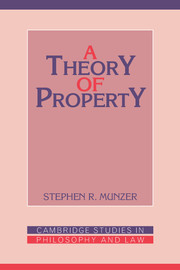Book contents
- Frontmatter
- Contents
- Preface and acknowledgments
- 1 Property, justification, and evaluation
- Part I Property rights and personal rights
- 2 Understanding property
- 3 Persons and their bodies
- Part II From individuals to social context
- Part III Justification and distributive equity
- Part IV Applications
- Table of cases
- Index of names
- Index of subjects
2 - Understanding property
Published online by Cambridge University Press: 05 June 2012
- Frontmatter
- Contents
- Preface and acknowledgments
- 1 Property, justification, and evaluation
- Part I Property rights and personal rights
- 2 Understanding property
- 3 Persons and their bodies
- Part II From individuals to social context
- Part III Justification and distributive equity
- Part IV Applications
- Table of cases
- Index of names
- Index of subjects
Summary
POPULAR AND SOPHISTICATED CONCEPTIONS OF PROPERTY
Consider how different the world would be if it contained no property. It is logically possible that it could contain all the artifacts that it now does. It could have houses and automobiles, factories and tools. Yet if it did, no one would stand in relation to those artifacts as people do to property. Persons might possess artifacts in the sense of having physical contact with or control over them. But they would have no right to exclude others and no normative power to transfer artifacts to others. Persons would also lack any such right or normative power over things that are not artifacts. They would have no property in land or plants or minerals. Furthermore, no other entity would stand in relation to things as people now do to property. States, cities, tribes, corporations, and partnerships would have no property.
If one turns from what is logically possible to what is causally and socially plausible, the no-property world seems even more different from the world as it is. Perhaps people would make simple artifacts such as knives and huts. But it seems unlikely that they would create such things as automobiles and factories, for these things require great capital investment and cooperative activity. People would probably not make the necessary sacrifices unless they could be confident of substantial control over the use and disposition of these things – which would require property rights.
- Type
- Chapter
- Information
- A Theory of Property , pp. 15 - 36Publisher: Cambridge University PressPrint publication year: 1990
- 1
- Cited by



